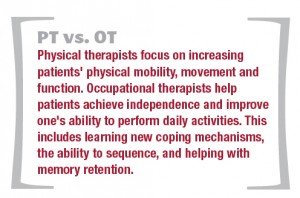Physical vs Occupational Therapy - What's Right for You?

Debilitating injuries and chronic pain can leave you feeling helpless. Whether your issue stems from illness, actions, genetics, or old age, having a painful handicap of any kind can add undue stress to your life. Thankfully, there are many different therapy options available for those facing such debilitating discomforts. Physical therapy (physiotherapy) and occupational therapy exist to help treat immobilizing, chronic, and debilitating conditions in hopes of restoring one's ability to function independently. While the process and science for both therapies differ, both attempt to aim for the same general end results. This article will focus on the differences between physical and occupational therapy, and how each one can potentially provide benefit for those facing a debilitating condition.
Understanding the difference

At first glance, physical therapy and occupational therapy appear to do (and achieve) the same thing - Restore one's ability to function independently, and free of pain. However, as similar as the two sciences are, their underlying objectives are quite different.
Physical therapy - The main goal of physical therapy is to treat the immediate physical issue that is causing the ailment in the patient. Physical therapists tend to focus on evaluating and improving an individual's physical disabilities and injuries.
Occupational therapy - The main goal of occupational therapy is to restore one's independence through physical, social, and psychological treatments. Occupational therapists tend to focus on evaluating and improving an individual's functional abilities.
While occupational and physical therapists focus on varying degrees of specialization, both sciences help educate the patient on how to be as healthy as possible. Both professional therapists will help educate the patient on avoiding injury, the importance of the healing process, and understanding the bodies limitations.
Use cases for physical therapy
The main purpose of physical therapy is to support physical rehabilitation, so it stands to reason that the primary use cases relate to physical ailments. Below you will find a few of the conditions that physical therapy can help support
Pain management - From ultrasounds and electrical pulse stimulation, to muscle relaxers and massages, physical therapists can help lessen and eliminate pain in the body.
Mobility enhancements - Physical therapists, with the help of stretching and strength training, can help improve bodily mobility and restore physical function. Physical therapy can also help those seeking help in improving their balance and coordination.
Vascular, stroke, heart, and lung conditions - Patients facing any sort of internal organ disability can also benefit from physical rehabilitation. Cardiovascular training, along with mobility and strengthening exercises, can greatly improve one's ability to recover.

Use cases for occupational therapy
Unlike physical therapy, occupational therapy focuses on restoring the functionality and independence of one's body. While regaining one's basic motor functions can be physical in nature, the focus is a bit more physiological. Below you will find a few of the conditions that occupational therapy can help support.
Social and psychological disease treatments - Individuals with mental and social handicaps can often benefit from an occupational therapist. Occupational therapy can help patients reach a desired end goal - Drinking a cup of water, going to the bathroom, or performing basic motor functions are all prime examples. The overall goal here is for the occupation therapist to help one accomplish their daily activities while compensating for physical impairments caused by social and psychological issues.
Severe conditional injuries - Physical therapists can help restore form and function to those who might have faced serious injuries. War veterans who have faced crippling injuries would typically seek an occupational therapist to help them recover. Many occupational therapists are educated in prosthetic devices, and can help individuals adapt to their new conditions.

While physical and occupational therapy both help with recovery, the processes and focus for each specialization can vary greatly. Physical therapists attempt to treat the physical condition that is causing the disability, while occupational therapists look to restore the functional independence of those facing disability. Regardless of your condition, If you fear that therapy might be required, seek the opinion of a qualified medical-professional for an accurate diagnosis.